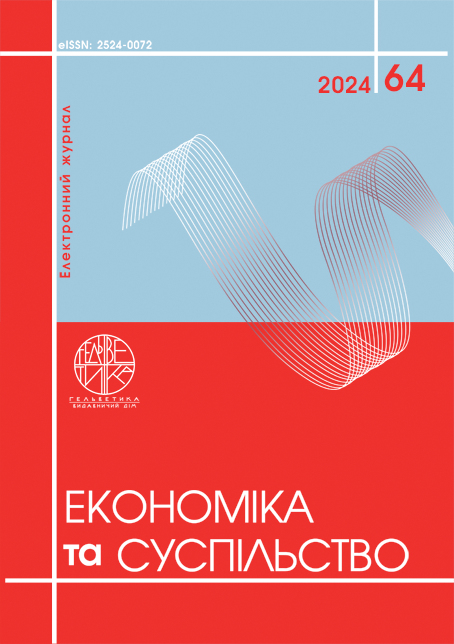IMPORT OF INSTITUTIONS AS A COMPONENT OF ECONOMIC DEVELOPMENT
Abstract
The article describes the peculiarities of the import of institutions as a way of implementing institutional changes in the economic system. The article’s topic is a relevant theoretical problem within the research framework into the new institutional economics, as it substantiates ways of realizing the impact of imported institutions on economic systems development. The author describes the constituent elements of the institutional environment such as formal and informal institutions, analyses the effectiveness of implementing institutional changes due to the congruence of institutions, characterizes the process of institutions importing from another institutional environment, the advantages of exporting countries and importing countries, as well as the difficulties associated with implementing new elements into the institutional environment. The author analyses the relationship between the institutional (corruption perceptions index, index of economic freedom, international property rights index) and economic development (gross domestic product per capita) of the European Union countries. According to the results of the analysis of institutional and economic development of the European Union countries that is based on statistical data from recent years, it was empirically established that there is a link between these indicators. The author explains state policy recommendations regarding importing European Union institutions into the domestic institutional environment to create favourable conditions for ensuring European integration, post-war recovery and the stable development of the domestic economy. The priority measures in this direction should be a preliminary analysis of the experience of the implementation of the institution's import if there is one, which is planned to be copied, implementation of measures to control the general level of transaction costs, ensuring the congruence of the existing institutional environment with "new" institutions, responding to feedback from society and adjusting the implemented reforms if necessary. The author also warns that the efficiency of imported institutions depends on the level of congruence between new and old elements of the institutional environment.
References
Липов В.В. Гнучка інтеграція: історичний досвід Європи та значення для України. Український щорічник з європейських інтеграційних студій. Випуск ІІІ. Україна – Європейський Союз: від партнерства до асоціації. 2019. С. 214–223.
Штань М.В. Інституційні детермінанти економічної політики держави. Економіка та суспільство. 2023. № 57. DOI: https://doi.org/10.32782/2524-0072/2023-57-90
Corruption Perceptions Index. Transparency International. URL: http://www.transparency.org/
Grazhevska N., Gaidai T., Mostepaniuk A., Zavazhenko A. Institutional dysfunctions as a factor of convergent-divergent institutional development of post-socialist countries. Access to science, business, innovation in digital economy, ACCESS Press. 2021. Vol. 2(3). pp. 290–308. DOI: https://doi.org/10.46656/access.2021.2.3(7).
Index of Economic Freedom Data. URL: https://www.heritage.org/index/explore
International Property Rights Index. URL: https://www.internationalpropertyrightsindex.org/
North D. Understanding the Process of Economic Change. Princeton University Press. 2005. 200 p. DOI: https://doi.org/10.1515/9781400829484
Pejovic S. The Market for Institutions Versus The Strong Hand of The State. Economic Institutions, Market and Competition. 1996. Pp. 111–125.
World Bank Open Data. URL: https://data.worldbank.org/
Lypov V. (2019) Hnuchka intehratsiya: istorychnyy dosvid Yevropy ta znachennya dlya Ukrayiny [Flexible integration: historical experience of Europe and significance for Ukraine]. Ukrayinskyy shchorichnyk z yevropeyskykh intehratsiynykh studiy [Ukrainian yearbook on European integration studies], no 3, pp. 214–223.
Shtan M. (2023) Instytutsiyni determinanty ekonomichnoyi polityky derzhavy [Institutional determinants of the state economic policy]. Ekonomika ta suspilstvo [Economy and society], no 57. DOI: https://doi.org/10.32782/2524-0072/2023-57-90
Corruption Perceptions Index. Transparency International. Available at: http://www.transparency.org/
Grazhevska N., Gaidai T., Mostepaniuk A., Zavazhenko A. (2021) Institutional dysfunctions as a factor of convergent-divergent institutional development of post-socialist countries. Access to science, business, innovation in digital economy. ACCESS Press, no 2(3), pp. 290–308. DOI: https://doi.org/10.46656/access.2021.2.3(7)
Index of Economic Freedom Data. Available at: https://www.heritage.org/index/explore
International Property Rights Index. Available at: https://www.internationalpropertyrightsindex.org
North D. (2005) Understanding the Process of Economic Change. Princeton University Press. 200 p. DOI: https://doi.org/10.1515/9781400829484
Pejovic S. (1996) The Market for Institutions Versus The Strong Hand of The State. Economic Institutions, Market and Competition, pp. 111–125.
World Bank Open Data. Available at: https://data.worldbank.org/
Copyright (c) 2024 Андрій Заваженко

This work is licensed under a Creative Commons Attribution 4.0 International License.


